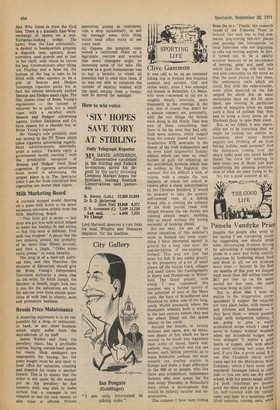SPORTING LIFE
Clive Gammon
It was odd to be on an extended fishing trip in Ireland this troubled summer and autumn. Odd and rather nasty, since I was amongst old friends in Belmullet, Co Mayo, who were concerned to tell me at roughly hourly intervals, more frequently in the evenings in the pub, that of course they didn't for a minute connect me, personally, with the evil things the British were doing in the North. That was nice of them, considering that there in the far west they had only Irish news sources, which ranged from the merely biased and heavily-selective RTE newcasts to the frenzy of the Irish Independent and its even more disgraceful Sunday edition which can bear no small burden of guilt for whipping up the anti-British hysteria which was so evident in the Republic this summer. Not too difficult a task, of course, with a people the vast majority of whom left school at twelve after a sharp indoctrination by the Christian Brothers. It would be pleasant to take the entirely self-centred view of a fishing friend who is viewing the collapse of the Irish tourist trade with delight because the car ferries are running almost empty, enabling him to travel without the boring necessity of booking ahead.
But not easy, for one of the minor casualties of this summer's work in Ireland has been something I have interested myself in greatly for a long time now: the popularization of sea-angling in Ireland. This was not just had news for fish. It has added greatly to the prosperity of a lot of small places off the tourist track, villages and small towns like Castlegregory in Kerry and Dungarvan in Waterford. The latest project, with which I was concerned this summer, was a further survey of the potential of part of the Mayo coast, the bays of Broadhaven and Blacksod on either side of the long, sandy Mullet peninsula where the Nantucket whalers built a station in the last century before they and the others fished out the sperm whales to the north.
Around the islands, in twenty fathoms and more, are, at times, vast shoals of fish which we have proved to be much less legendary than wells of blood, heavy cod, pollack, ling, coalfish and red sea bream, such fishing potential as to make Belmullet perhaps the most notable sea angling station in Europe and make a huge difference to the 800 or so people, who live there and roundabout, subsistence farmers who now queue for the dole every Thursday in Belmuilet's main street, a development that would be entirely natural and undestructive.
This summer I have been fishing
from the m.v. ' Finola,' the research vessel of the Fisheries Trust in Ireland. Our task was to find new marks, pinpointing fish-rich places and passing the information to local fishermen who are beginning to take out visiting anglers. In fact, it turned out to be a patchy summer because of an abundance of herring, sprat and sand eels which kept the big fish well fed and also constantly on the move so that the usual places to find them, the underwater reefs which we could find with the echo-sounder, were often deserted as the fish ranged far afield. But on some memorable days we did hit upon them, one evening in particular south of Inisglora when we made such a haul of pollack that they had to bring a lorry down on to Blacksod Quay to take them away.
But, as we fished, it was impossible not to be conscious that we might be seeking out useless information. How many British anglers are thinking of an Irish fishing holiday, .next summer? And the newscasts ceming over the ship's radio (and you could hardly blame the crew for wanting to hear every one of them) just kept underlining the seeming pointlessness of what we were trying to do.
No, not a good summer at all.


































 Previous page
Previous page